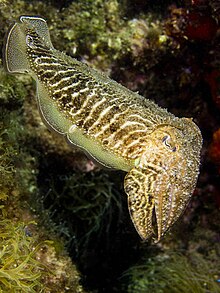「ヨーロッパコウイカ」の版間の差分
削除された内容 追加された内容
en:Common Cuttlefish20:13, 8 October 2010を翻訳 |
(相違点なし)
|
2010年10月14日 (木) 17:09時点における版
| ヨーロッパコウイカ | ||||||||||||||||||||||||
|---|---|---|---|---|---|---|---|---|---|---|---|---|---|---|---|---|---|---|---|---|---|---|---|---|

| ||||||||||||||||||||||||
| 分類 | ||||||||||||||||||||||||
| ||||||||||||||||||||||||
| 学名 | ||||||||||||||||||||||||
| Sepia officinalis Linnaeus, 1758 | ||||||||||||||||||||||||
| シノニム | ||||||||||||||||||||||||
|
ヨーロッパコウイカ(European Common Cuttlefish)は、最も大きく、そして最も有名なコウイカである。外套膜の大きさは49cm程度、重さは4kgになる[1]。亜熱帯地域の海のものは比較的小さく、30cmを超えることは稀である[2]。
ヨーロッパコウイカは、少なくとも地中海、北海、バルト海に自生するが、亜種は南アフリカにも生息している。水深200m程度の砂や泥の海底に住む。他の多くのコウイカと同様に、浅い海で産卵する[3]。
捕食者と餌

ヨーロッパコウイカは、アンコウやメカジキのような[4][5]大型の魚[6]やクジラ[6]に捕食されることが知られている。
また、天然では硬骨魚綱やカイアシ類、甲殻類、イカ、腹足綱、二枚貝、ヒモムシ、貝虫亜綱等の様々な動物を捕食している[7]。
2008年の研究で[8]、ヨーロッパコウイカは胚の段階で最初に出会った獲物を、成長してからも好む傾向があることが明らかとなった。例えば一般的には、ヨーロッパコウイカはカニよりもエビを好むが、胚の段階で最初にカニと出会った個体はエビよりもカニを多く捕るようになる。
分類学

ヨーロッパコウイカのタイプ標本が獲られた場所については"Oceano"(海)と記されているだけで、具体的にどこの場所なのかは分かっていない。この標本は現在、ロンドン・リンネ学会に預けられている[9]。
Sepia officinalis jurujubai Oliveira, 1940は、当初ヨーロッパコウイカの亜種として記されたが、現在ではアメリカアオリイカの後行シノニムであるとされている[10]。
出典
- ^ Reid, A., P. Jereb, & C.F.E. Roper 2005. Family Sepiidae. In: P. Jereb & C.F.E. Roper, eds. Cephalopods of the world. An annotated and illustrated catalogue of species known to date. Volume 1. Chambered nautiluses and sepioids (Nautilidae, Sepiidae, Sepiolidae, Sepiadariidae, Idiosepiidae and Spirulidae). FAO Species Catalogue for Fishery Purposes. No. 4, Vol. 1. Rome, FAO. pp. 57–152.
- ^ Roper C.F.E., M.J. Sweeney & C.E. Nauen 1984. Cephalopods of the world. Food and Agriculture Organization, Rome, Italy. Vol. 3, p. 277.
- ^ Norman, M.D. 2000. Cephalopods: A World Guide. ConchBooks.
- ^ Hernández-Garcia, V. 1995. The diet of the swordfish Xiphias gladius Linnaeus, 1758, in the central east Atlantic, with emphasis on the role of cephalopods. Fishery Bulletin 93: 403-411.
- ^ Royer, J., M.B. Santos, S.K. Cho, G. Stowasser, G.J. Pierce, H.I. Daly & J.-P. Robin. 1998. Cephalopod consumption by fish in English Channel and Scottish waters. International Council for the Exploration of the Sea: The impact of Cephalopods in the Food Chain and Their Interaction with the Environment, CM/M: 23.
- ^ a b Le-Mao, P. 1985. Place de la seiche Sepia officinalis (mollusque, Cephalopoda) dans les chaines alimentaires du golfe Normano-Breton. Cah. Biol. Mar. 26(3): 331-340.
- ^ Boletzky S.v. & R.T. Hanlon. 1983. A Review of the Laboratory Maintenance, Rearing and Culture of Cephalopod Molluscs. Memoirs of the National Museum of Victoria: Proceedings of the Workshop on the Biology and Resource Potential of Cephalopods, Melbourne, Australia, 9–13 March 1981, Roper, Clyde F.E., C.C. Lu &F.G. Hochberg, ed. 44: 147-187.
- ^ Anne-Sophie Darmaillacq, Clemence Lesimple, and Ludovic Dickel. 2008. Embryonic visual learning in the cuttlefish, Sepia officinalis. Animal Behaviour 76: 131–134
- ^ Current Classification of Recent Cephalopoda
- ^ Adam, W. & W.J. Rees. 1966. A Review of the Cephalopod Family Sepiidae. John Murray Expedition 1933-34, Scientific Reports 11(1): 1-165, 46 plates.
- Taxa Associated with the Family Sepiidae Keferstein, 1866
- Fluckiger, M., G.D. Jackson, P. Nichols, P. Virtue, A. Daw & S. Wotherspoon. 2008. An experimental study of the effect of diet on the fatty acid profiles of the European Cuttlefish (Sepia officinalis). Marine Biology (published online first). doi:10.1007/s00227-008-0932-0
